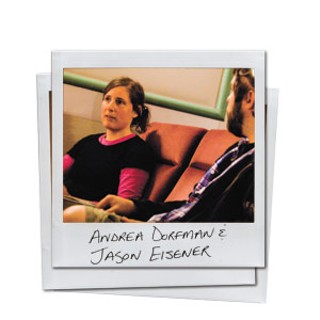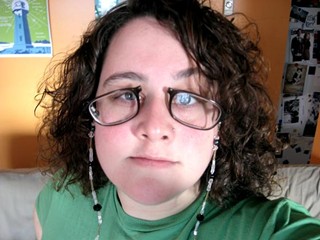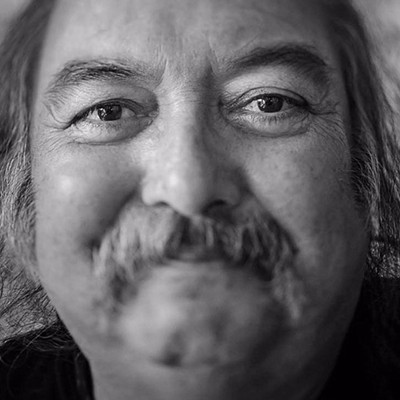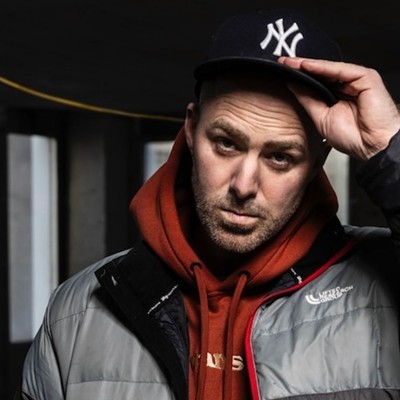Andrea Dorfman moved from Toronto in 1993 to attend NSCAD. Her 2000 feature debut Parsley Days screened at the Toronto International Film Festival as well as the Atlantic Film Festival, where Love That Boy (2003) and the documentary Sluts(2005) had their premieres. Dartmouth native Jason Eisener co-wrote and directed the fake trailer for Hobo with a Shotgun, which won the Grindhouse competition hosted by Robert Rodriguez last year. A Hobo feature is in development. His Treevenge will screen on opening weekend at the genre festival Fantasia in Montreal this July. They spoke before an early evening screening in the balcony of The Oxford.
Jason Eisener: You did films through the co-op . Were you applying for grant money?
Andrea Dorfman: I did a whole bunch of films when I was a camera assistant, just trying to figure out what my voice was, and practicing and experimenting with the medium. And I did those through the film co-op, but I never actually got any grants, I was just doing them on my own with short ends that I would get from being a camera assistant.
Eisener: That's cool that you just went and did it. I always associated shooting on film with having money to do it. I'm not really good at applying for grants---I produced a Film 5 last year and that's the closest I've gotten to having some money on a film.
Dorfman: What about Treevenge?
Eisener: It's just out-of-pocket and friends helping out. It's on video, shooting with the Sony F900. But, it's kinda weird: If I had an idea for a film or wanted to shoot a film, I just went out and did it. I didn't want to wait. Part of me doesn't even want to wait to get everything in line for Hobo---I just want to go out and shoot it now, shoot it with nothing.
Dorfman: And that's really something that you and I, Jason, have in common. I think that philosophy exactly. You could be the type of filmmaker who thinks that you need permission, and wait around for grants or go through some designated, step-by-step process, or you could just do it. And I think that's what a filmmaker is. You don't need to go school for it, you don't need a grant, you just really need a camera and friends.
Eisener: I've had so many friends just come out and give up so many weekends to help me realize my vision, you know? I haven't seen that in any other art form.
Dorfman: It's like the Amish raising a barn. No other art form requires so many people to make it happen.
What was the film community like in '93?
Dorfman: I started working in the industry in the mid-'90s. That's when films started to be made here on a larger scale. It was a great time for anybody who wanted to get into film because they needed bodies---they needed people to lug equipment around, or be runners, production assistants. I was part of a huge group of people who were trained at a time when a lot of films started coming to the city.
I think I learned a lot about directing just by being on set and watching directors. As a camera assistant, you're right up between the director and the cinematographer and you're on the floor putting tape down for actors. So you're watching everything right up at the front. A film crew is like a funnel that ends up in this point that is the camera.
Is this a good town to make films in?
Dorfman: Oh yeah.
Eisener: I've never been somewhere else where people were so willing to give up everything and just help you make a film. I couldn't see myself moving away anytime soon because I don't think I could find that anywhere else. I could say, 'OK, I want to shoot something tomorrow,' and I would have a bunch of friends and people who want to come out.
Dorfman: I lived in Toronto for a few years---mainly because I just needed a change---but as far as making films in Toronto, it was totally overwhelming. I felt like it would've taken a lot of time and energy to create anything close to the filmmaking community that I had formed here. It's just way more tangible here.
Eisener: For me, my favourite thing about making films is to have an audience sit down and watch the world you've created. I remember when I made my first film coming out of NSCC, we made an hour-long, ridiculous action-comedy movie. And after that I was just excited---me and all my friends and everyone at school helped to make this movie, and just that people could come and sit down and watch a world that we had created, and for that hour they were in the dark just watching this flat screen with an image rolling on it. I felt like after that I could die and be kinda happy: I've left my mark in some sort of way. That will always be around for people to see.
Dorfman: I often say that, that I could die at anytime and there's nothing I feel like I need to do in order to lead a fulfilling life and my career is definitely part of that. The fun thing about what we do is actually not knowing where it's gonna go, and where the technology is gonna go. Who could've known that it would be all about YouTube right now, five years ago? I think what you're saying is it's really fun to entertain people. We're in the business of entertainment. And we're so lucky to be here. And the best part of it is, we get to wear what we want.
---Tara Thorne

Read more! Listen more!
Read the full film interview here.
Audio wextra: more Dorfman and Eisener.














